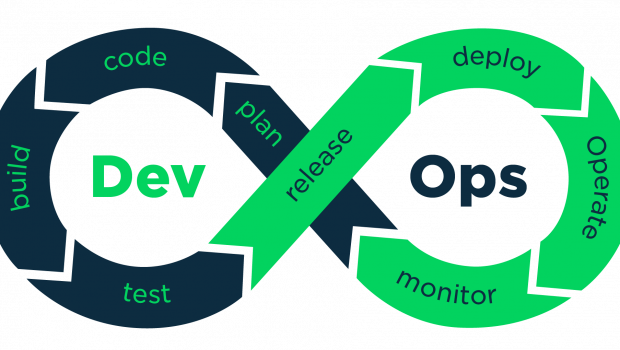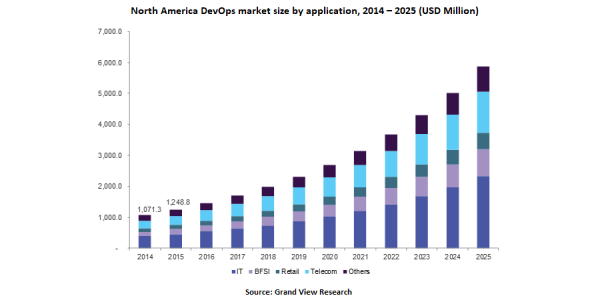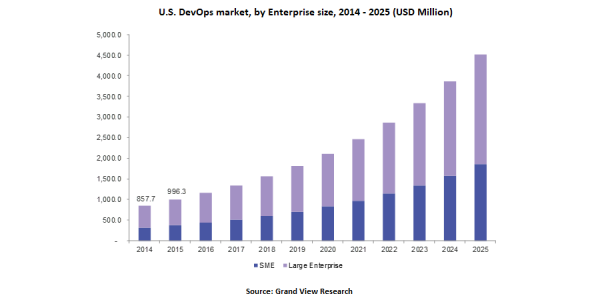Top Trends in DevOps Adoption across Enterprises
The rapidly expanding cloud computing services, mobile computing, automation and Internet of Things (IoT), are potentially driving organizations to transform into digital enterprises in a bid to enhance productivity and profitability. The need to meet changing customer needs, deliver better quality products, automate the software delivery chain and increasing operational efficiency between teams are projected to be the key factors instigating organizations to take advantage of DevOps solutions. This demand for process automation is poised to create growth opportunities for the players operating in the global DevOps market.
Top Trends in DevOps Market
North America DevOps market size by application, 2014 – 2025 (USD Million)
Image Source: www.grandviewresearch.com
According to Grand View Research, the global DevOps market is estimated to reach USD 12,848.9 million by 2025, growing at a CAGR of 18.6% from 2017 to 2025. Traditional software development models are becoming obsolete and are unable to meet the evolving needs of the customers. Introduction of new technologies and processes such as ITIL, Agile, continuous delivery and the growth in cloud services have allowed organizations to increase stability, reliability, streamline workflow, and enhanced ability to scale which have radically transformed the practice of information technology. DevOps solutions are gaining momentum and witnessing demand from enterprises of all sizes across various verticals. DevOps implements Lean and Agile principles into the IT value stream that helps address a variety of inefficiencies faced across the entire software development and deployment lifecycle.
Following are the top trends observed in the market:
#1 Automation is key to DevOps
One of the critical aspects of DevOps is automation. Traditional development and deployment have proven to deliver slower and less flexible working environments resulting in poor quality and buggy software releases. However, organizations find it challenging to adopt DevOps, owing to the highly complex and distributed enterprise environments. Automation solutions like Liatrio.com helps reduce the time taken by developers to complete mundane and repetitive tasks, thereby increasing production and reducing the friction between critically interrelated functions that are not appropriately orchestrated. To ensure a successful implementation of DevOps automation, organizations must evaluate their business processes with respect to what to automate, how and the extent of automation across the distributed infrastructure. Organizations must consider all divisions, teams, silios, legacy technologies, and process to strike a balance in automating processes.
#2 Enhance Collaboration between Development and Operations Teams
DevOps help enhance the collaboration between development, operations, and quality assurance teams to facilitate continuous integration, continuous testing, and continuous delivery of software. These tools enable enterprises to automate the software development and testing lifecycle by standardizing and automating the movement & deployment of code across different environments. DevOps tools enable developers to integrate a continuous feedback loop such that they can shorten the response time and continuously release software based on user feedback and usage behavior. For instance, a U.S. aerospace company adopted DevOps solutions in a bid to increase the quality of software, streamline testing processes and reduce efforts between modules. Implementing the Agile DevOps Certification enabled the organization to increase automation coverage, reduce execution cycle time by 30%, enabled timely regression testing and enhanced overall productivity.
#3 Increasing Adoption across Enterprises
U.S. DevOps market, by Enterprise size, 2014 – 2025 (USD Million)
Image Source: www.grandviewresearch.com
A study conducted by cloud management provider RightScale suggests that in 2017, 87% of enterprises have adopted some aspect of DevOps principles. However, due to lack of technical know-how, the complexity of deployment and lack of standardization, only 30% of enterprises have been able to adopt company-wide DevOps solution. Most SMBs adopt a cloud-based infrastructure and cloud data storage solutions for various production environments, service delivery and for storage of various customer data. This rapid adoption of cloud services & solutions has instigated the growth of DevOps as a cloud deployment model which is estimated to reach USD 8,227.2 million by 2025. Increasing penetration and ownership of technologies across consumer bases will lead enterprises to increasingly adopt Social, Mobile, Analytics, and Cloud (SMAC) to transform digitally to support critical infrastructure and business processes across cloud deployments.
#4 Highest DevOps Adoption seen across IT & BFSI Industries
The IT industry is witnessing a high adoption of DevOps tools and solutions to help achieve faster deployment of software products, release multiple modules and achieve higher operational benefits. Software development firms are investing in automation solutions for operational processes to aid in the management of the software development lifecycle, improve quality of software, automate testing, enhance customer services and meet evolving business needs. The IT industry is witnessing a budget constraint associated with software development and are looking for innovative solutions to modernize the IT domain and remain competitive. For instance, Infosys partnered with McCamish Systems to develop and implement a scalable, flexible and agile BPM solution automating several manual processes, mitigating risk of human errors and reduce average handling time by 80%, potentially saving millions in operational costs.
According to Grand View Research, the BFSI application segment is expected to grow at the highest CAGR over the next few years. This growth can be attributed to the growing penetration of smartphones and devices for commercial and banking transactions. The need to rapidly deliver digital services and solutions to enhance the customer experience as well as address the changing regulatory mandates will drive the adoption of DevOps. For instance, Infosys helped a global bank implement DevOps to improve service quality, enable faster software releases and cost optimization. Implementing Agile and DevOps solutions from Infosys enabled the financial institution to reduce its software release cycle down to 3-4 weeks from 12 weeks and improve reliability by 25% as well as achieve operational cost savings of USD 2 million.
#5 Lack of Standardization and KPI Metrics
Automation of a specific process across an enterprise with limited knowledge of tools can result in siloed automation and using manual ad hoc processes. With no defined framework for the desired state of automation of activities and processes, organizations can deploy DevOps to have their own desired state of automation without a structured approach. Multiple vendors are involved in the management of different stages of an application and having their distinct process for development life cycle makes it a challenging task to develop a standardized procedure.
Hence, standardizing KPI metrics, processes, practices, governance and enterprise-wide control over DevOps implementation in the absence of a centralized DevOps team becomes exceptionally challenging. Most organizations and their IT teams still lack training in DevOps on tools, processes, practices in continuous integration, testing, deployment and operations which hinders industry-wide collaboration to define a standardized DevOps practice. With DevOps implementation being unique for each organization, there isn’t a standardized performance indicator that can accurately measure the ability to develop and deploy with speed and stability.
What Future Holds: Market Overview
As per Grand View Research, the DevOps market will witness strong competition in the years to come due to the emergence of newer companies and evolving consumer demands. Increasing adoption across numerous small and medium businesses (SMBs) and large global organizations can further intensify the market competition. There is an increasing shift towards rapid development, reliable and high-performance service deliveries which will lead to increased implementation of collaborative workflows among Dev and Ops teams. With increased DevOps implementations, the infrastructure becomes more generic leading to growth of more sophisticated APIs and further decomposition with microservices.
Some of the prominent DevOps market players include IBM Corporation, CA Technologies, Cisco Systems, Inc., Hewlett Packard Enterprise, Chef, Inc.; Puppet Labs, Inc.; Docker, Inc.; and Clarizen, Inc., among others. Technological proliferation, increased penetration of smartphones, enhanced network connectivity, and high adoption rate of digital services are the key factors that have influenced the increased adoption of DevOps solutions among organizations across North America. Asia Pacific is poised to witness impressive demand for DevOps solutions, owing to the increased spending on connected devices, investments in various cloud infrastructures and IoT technologies, and growing demand for digital services in countries such China, India, Japan, and other developing nations.
Author Bio:

Abhishek currently works as a Research Analyst at Grand View Research in the Information and Communication Technology (ICT) team. He has more than 3+ years of experience in market research, business intelligence, & consulting industry. He has also had a year’s experience working in the client servicing sector. His primary focus is on assessing new market opportunities, statistical modeling, market sizing and forecasting analysis, and evaluating competitor strategies. He has expertise in various industries that include enterprise software solutions, next-generation technologies, general industrial manufacturing, and ICT technologies.
He holds a bachelor’s degree in Information Technology, from KIIT College, MDU University, and Master’s Degree in Management of Information Technology, from The University of Nottingham, UK.


















